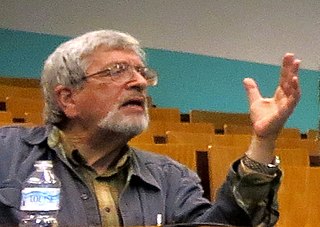Related Research Articles
Musicology is the scholarly analysis and research-based study of music. Musicology departments traditionally belong to the humanities, although some music research is scientific in focus. Some geographers and anthropologists have an interest in musicology so the social sciences also have an academic interest. A scholar who participates in musical research is a musicologist.
Music history, sometimes called historical musicology, is a highly diverse subfield of the broader discipline of musicology that studies music from a historical point of view. In theory, "music history" could refer to the study of the history of any type or genre of music. In practice, these research topics are often categorized as part of ethnomusicology or cultural studies, whether or not they are ethnographically based. The terms "music history" and "historical musicology" usually refer to the history of the notated music of Western elites, sometimes called "art music".
Susan Kaye McClary is an American musicologist associated with "new musicology". Noted for her work combining musicology with feminist music criticism, McClary is professor of musicology at Case Western Reserve University.
New musicology is a wide body of musicology since the 1980s with a focus upon the cultural study, aesthetics, criticism, and hermeneutics of music. It began in part a reaction against the traditional positivist musicology of the early 20th century and postwar era. Many of the procedures of new musicology are considered standard, although the name more often refers to the historical turn rather than to any single set of ideas or principles. Indeed, although it was notably influenced by feminism, gender studies, queer theory, postcolonial studies, and critical theory, new musicology has primarily been characterized by a wide-ranging eclecticism.

Allen Forte was an American music theorist and musicologist. He was Battell Professor Emeritus of the Theory of Music at Yale University and specialized in 20th-century atonal music and music analysis.
Howard Pollack is a prominent American pianist and musicologist, known for his biographies of American composers.

Richard Taruskin is an American musicologist, music historian, and critic who has written about the theory of performance, Russian music, 15th-century music, 20th-century music, nationalism, the theory of modernism, and analysis. As a choral conductor he directed the Columbia University Collegium Musicum. He played the viola da gamba with the Aulos Ensemble from the late 1970s to the late 1980s. Taruskin received his B.A. magna cum laude (1965), M.A. (1968) and Ph.D. in historical musicology (1976) from Columbia University.
Joseph Wilfred Kerman was an American critic and musicologist. One of the leading musicologists of his generation, his 1985 book Contemplating Music: Challenges to Musicology was described by Philip Brett in The Grove Dictionary of Music and Musicians as "a defining moment in the field." He was Professor Emeritus of Musicology at the University of California, Berkeley.
Richard Loqueville was a French composer whose music spanned the transition between Medieval and Renaissance music. A musician at Cambrai Cathedral, he taught the celebrated composer Guillaume Dufay there in 1413–1414.
Karl Geiringer was an Austrian American musicologist, educator, and biographer of composers. He was educated in Vienna but at the beginning of the Nazi years he emigrated to England and ultimately the United States, where he had a lengthy and distinguished career at several universities. He was a noted authority on Brahms, Haydn, and the Bach family, and a prolific author.
Don Harran was professor of Musicology at the Hebrew University of Jerusalem.
Glenda Goss is an American author and music historian whose special interests are music and culture, early modernism, critical editing, and European-American points of cultural contact. Her most notable work has revolved around the life and works of the Finnish composer, Jean Sibelius.
Gary Alfred Tomlinson is an American musicologist and the John Hay Whitney Professor of Music and Humanities at Yale University. He was formerly the Annenberg Professor in the Humanities at the University of Pennsylvania. He graduated from the University of California, Berkeley, with a Ph.D., in 1979 with thesis titled Rinuccini, Peri, Monteverdi, and the humanist heritage of opera.
Lewis H. Lockwood is an American musicologist whose main fields are the music of the Italian Renaissance and the life and work of Ludwig van Beethoven. Joseph Kerman described him as "a leading musical scholar of the postwar generation, and the leading American authority on Beethoven".

Philip Brett was a British-born American musicologist, musician and conductor. He was particularly known for his scholarly studies on Benjamin Britten and William Byrd and for his contributions to the development of lesbian and gay musicology. At the time of his death, he was Distinguished Professor of Musicology at the University of California, Los Angeles.
Dexter Edge is an American musicologist.

Ludwig Finscher was a German musicologist. He was a professor of music history at the University of Heidelberg from 1981 to 1995 and editor of the encyclopedia Die Musik in Geschichte und Gegenwart. He is respected internationally as an authority on the history of Western Classical music from the 16th century to contemporary classical music, with a view on music in cultural, social, historical and philosophical context, in a clear language for both specialists and lay readers.
Stephen Blum is an American scholar and musician, whose research has primarily been in ethnomusicology. He has lent a multidisciplinary approach to the writing and publication of numerous articles discussing a wide range of musical topics and ideas.

Mark Everist is a British music historian, critic and musicologist.

Harry White is an Irish musicologist and university professor. With specialisations in a) Irish musical and cultural history, b) the music of the Austrian baroque composer Johann Joseph Fux, and c) the development of Anglo-American musicology since 1945, he is one of the most widely published and influential academics in his areas of research. White is also a poet, with two published collections of poetry.